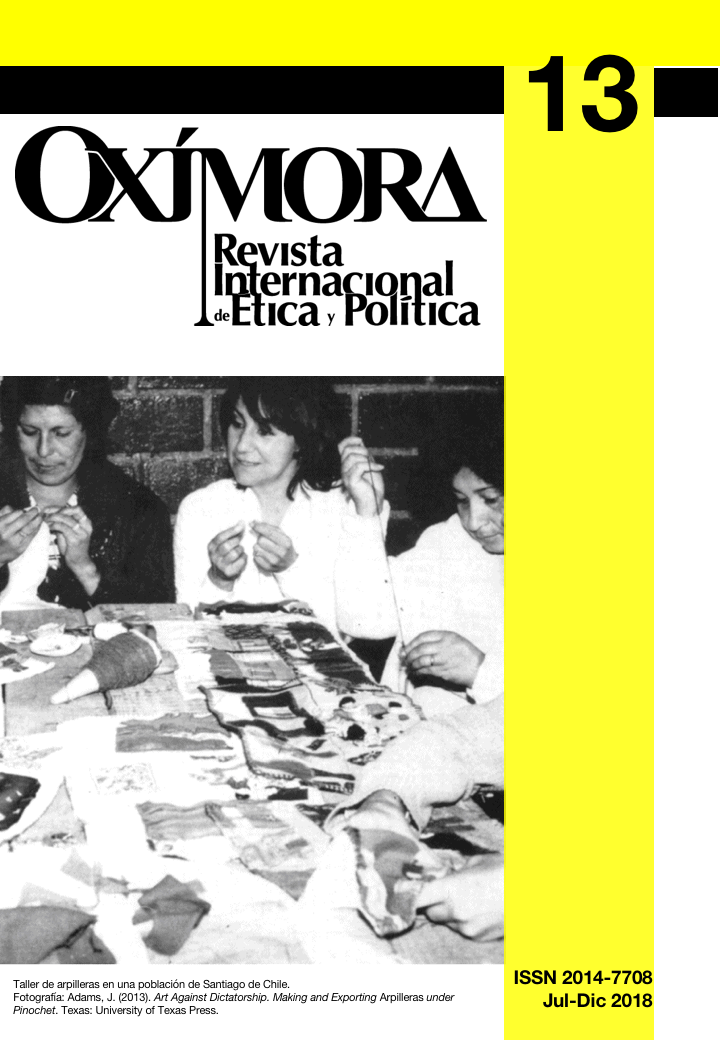Only a Bureaucrat Can Save Us: Žižek on the Relation between Bureaucracy and Revolution
DOI:
https://doi.org/10.1344/oxi.2018.i13.21881Keywords:
Bureaucracy, Revolution, Event, Radical Politics, Direct DemocracyAbstract
In the first section of this paper I expose some concepts related with the way Žižek understands radical politics. In the second, I delve into the meaning that “revolutionary event” has for the Slovenian philosopher. The next section deals with the importance of “bureaucracy” as the only means to consolidate the revolution. Therefore, Žižek’s bureaucracy opposes radically direct democracy, and consequently, in the last two sections of the paper, I compare some points of his position with Graeber’s ones, as he is one of the leading theoreticians of direct democracy.References
BADIOU, Alain. (1999). El ser y el acontecimiento. Buenos Aires: Manantial.
CASTRO-GÓMEZ, Santiago. (2015). Revoluciones sin sujeto. Slavoj Žižek y la crítica del historicismo posmoderno. México D.F.: Akal.
EAGLETON, Terry. (2010). Los extranjeros. Por una ética de la solidaridad. Barcelona: Paidós.
GELDERLOOS, Peter. (2015). The Failure of nonviolence. From the Arab Spring to Occupy. St. Louis: Left Bank Books.
GRAEBER, David. (2015) La utopía de las normas. De la tecnología, la estupidez y los secretos placeres de la burocracia. Barcelona: Ariel.
GRAEBER, David. (2014). Debt. The First 5000 years. Brooklyn: Melville House.
GRAEBER, David. (2011). Revolutions in Reverse: Essays on Politics, Violence, Art, and Imagination. Brooklyn: Automedia.
GRAEBER, David. (2009). Direct Action: An Ethnology. Oakland: AK Press.
GRAEBER, David. (2013). The Democracy Project. A History, A Crisis, A Movement. New York: Spiegel & Grau.
GRAEBER, David. (2001). Toward an Anthropological. Theory of Value. New York: Palgrave.
HAMZA, Agon., RUDA, Frank. (2016). Slavoj Žižek and Dialectical Materialism. New York: Palgrave.
HOBSBAWM, Eric. J. (1988). The Age of Revolution. 1789-1848. London: Cardinal.
KEARNEY, Robert. (1994). Modern Movements in European Philosophy. Manchester: Manchester University Press.
KEUCHEYAN, Razmig. (2014). The Left Hemisphere. Mapping Critical Theory Today. London/New York: Verso.
LENIN, Vladimir. [1902]. ¿Qué hacer? Problemas candentes de nuestro movimiento. Madrid: Akal, 2015.
LIPOVETSKY, Gilles. (2006). La era del vacío. Barcelona, Anagrama, 2006.
LIPOVETSKY, Gilles. (2017). De la ligereza. Barcelona: Anagrama.
SOLZHENITSYN, Aleksandr. [1973]. Archipiélago Gulag Barcelona: Tusquets Editores, 2005.
ŽIŽEK, Slavoj. (1999). El espinoso sujeto. El centro ausente de la ontología política. Barcelona: Paidós.
ŽIŽEK, Slavoj. (2005). Bienvenidos al desierto de lo Real. Madrid: Akal.
ŽIŽEK, Slavoj. (2011a). El acoso de las fantasías. Madrid: Akal.
ŽIŽEK, Slavoj. (2011b). En defensa de las causas perdidas. Madrid: Akal.
ŽIŽEK, Slavoj. (2011c). Primero como tragedia, después como farsa. Madrid: Akal.
ŽIŽEK, Slavoj. (2013). Pedir lo imposible. Madrid: Akal.
ŽIŽEK, Slavoj. (2014). Acontecimiento. Madrid: Sexto Piso.
ŽIŽEK, Slavoj. (2016). Menos que nada. Madrid: Akal.
ŽIŽEK, Slavoj. (2016). Problemas en el paraíso. Del fin de la historia al fin del capitalismo. Barcelona: Anagrama.
ŽIŽEK, Slavoj. (2016). La nueva lucha de clases. Los refugiados y el terror. Barcelona: Anagrama.
ŽIŽEK, Slavoj. (2017). “Alegato a favor de un socialismo burocrático”. Consultado el 7 de abril de 2018, Círculo de Bellas Artes de Madrid, en https://www.youtube.com/watch?v=4qMqVI25kPk
Downloads
Published
How to Cite
Issue
Section
License
a) Authors retain copyright and grant the journal the right of first publication.
b) Texts will be published under a Creative Commons Attribution License that allows others to share the work, provided they include an acknowledgement of the work’s authorship, its initial publication in this journal and the terms of the license.



